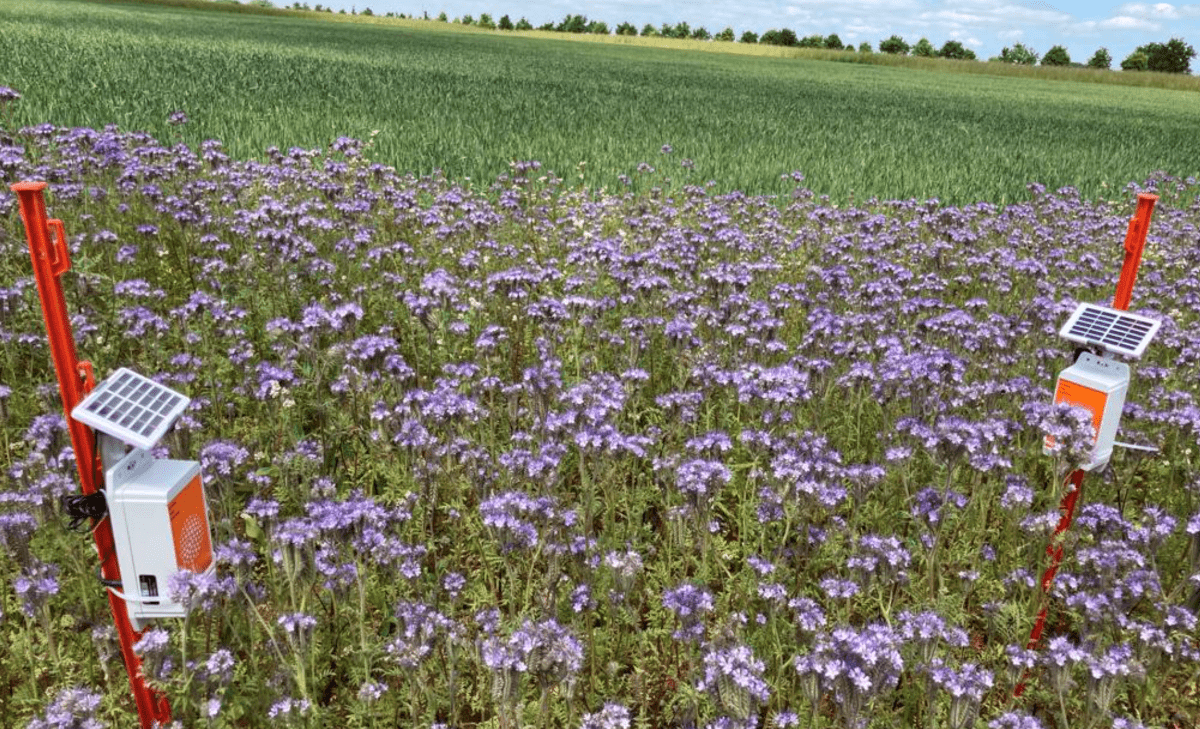
A joint collaborative project funded through Innovate UK and Defra’s Farming Innovation Programme aims to test and demonstrate the effectiveness of digital technology as a means of remotely monitoring wildlife diversity in a farming context.
With biodiversity monitoring set to increase through the introduction of policies and schemes, it’s vital to assist ecologists with access to scalable remote technologies, says the group behind it.
The work will be completed on a dairy and arable farm in Dorset. Participants include organic farmer Sophie Alexander, Agri-EPI Centre, AgriSound, Dorset Wildlife Trust, Pollenize CIC and Chirrup AI
As the group explains, 40% of insect species risk extinction, and a further 30% are endangered (New Scientist, 2019), yet few farmers have the tools to actively monitor or quantify on-farm biodiversity, despite it being an important measure of ecosystem, landscape, overall biological health of the farm and key public good.
Three separate remote sensing digital technologies will detect, identify, and quantify varieties of invertebrates and birds in correlation to flowering plants that they rely on. Insect conservation and pollination innovator AgriSound, who specialise in remote insect technology and environmental sensors to monitor pollinator populations have installed three unique in-field sensor devices for automated insect monitoring as part of the project.
The technology, Polly™ is said to be optimised for attracting pollinators from a broad spectrum of local insects and detects 24/7 through the use of a specialised bioacoustics technology with data transmitted and stored securely, “providing a comprehensive understanding of the pollinators on the farm.”
The approach combines other data sets across the farm, including those collecting using the Pollenize app to photograph and geolocate plant species. Chirrup AI will use artificial intelligence to monitor species of birds that are thriving on the farm. This, in turn, will reveal more about the diversity of bugs and seeds above ground, and the richness of life in the soil. The same transects monitored by the digital devices will be surveyed by a professional ecologist from Dorset Wildlife Trust to ground-truth the findings.
Sophie Alexander, farm owner of Hemsworth Farms, said: “I believe it is important to establish our biodiversity baseline and to continue to monitor progress. There are too few experienced ecologists with sufficient time to manage it all. We are therefore pleased to be involved with testing the data collection capabilities of digital technologies to assist ecologists and in this case, Dorset Wildlife Trust to ground truth the information and demonstrate how an organic farming system can nurture wildlife as well as produce food.”
This early-stage feasibility project, bringing together a technology start up with RTO and end user, will explore emerging applications of remote sensing to inform the development of a commercially relevant solution. This will catalyse a pipeline of further R&D across a much wider area, new research collaborations and accelerate research translation and development of new solutions.
Charlie Bowyer, Business Development Manager, Agri-EPI Centre said: “This innovative project is of great importance to the monitoring and management of biodiversity on farmland and showcases the collaborative efforts between the farming community and agri-tech innovators. “At Agri-EPI Centre we continually work with farmers to develop relevant and robust tech solutions to overcome the challenges faced in farming today and to futureproof the sector. “Being able to monitor biodiversity using remote sensing and AI will help landowners across the UK who want to monitor biodiversity. We currently face a real shortage of ecologists in the UK and the technology being used in this project will allow ecologists to survey more land more quickly, helping UK farmers to move towards biodiversity net gain and unlock the ecological and financial benefits this can bring.”
Casey Woodward, Founder and CEO of AgriSound, said: “We are thrilled to be embarking on this exciting new R&D project with Agri-EPI Centre and Hemsworth Farms. It’s a tremendous opportunity for all parties involved to put AgriSound’s cutting-edge pollinator monitoring technology to the test in a real-world farming context. We truly believe this project has the potential to shed new light on all of the great work happening across British farms to improve local biodiversity.
“This collaboration not only underscores the importance of partnerships in driving forward sustainable agriculture but also showcases the immense value of innovative sensing technologies for biodiversity assessment which are being increasingly required as consumers expect produce sourced from sustainable agricultural practices.
“We anticipate that the insights gained from this project will not only help Hemsworth Farms to better understand and manage biodiversity on their own sites but also act as an example for the wider industry, demonstrating how technology can be harnessed to promote biodiversity and sustainable farming practices.”







